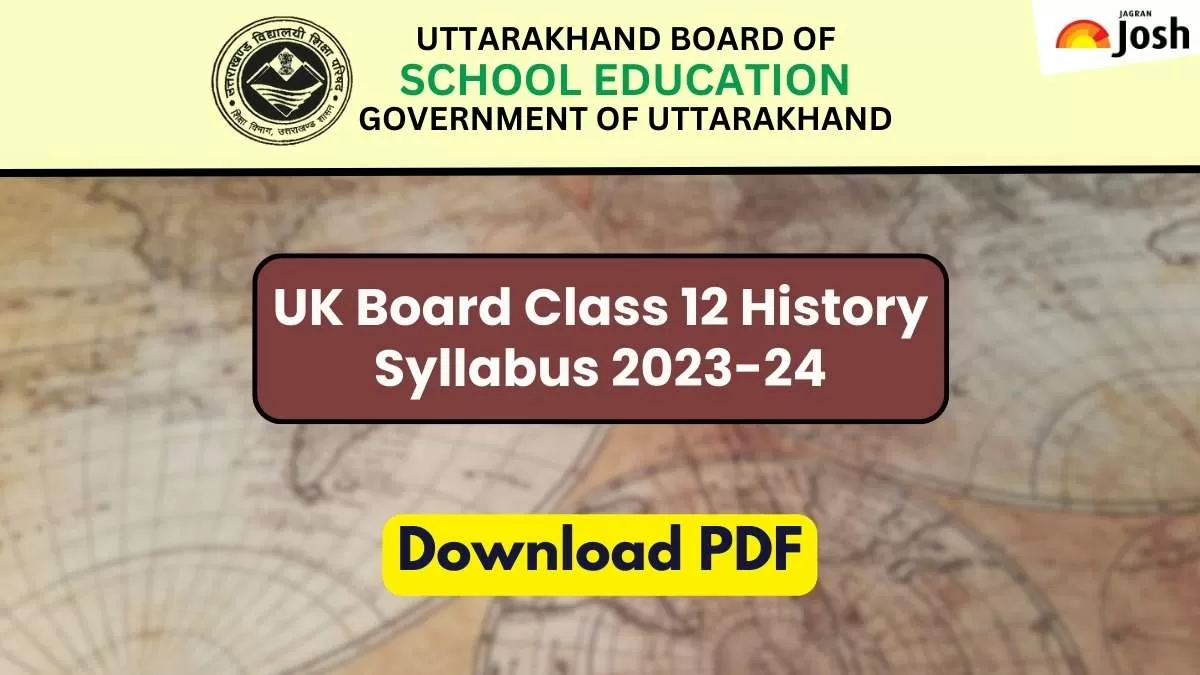UK Board 12th Syllabus History 2024: The Uttarakhand Board of Secondary Education syllabus for the 2023-24 session year is available to students. However, studying is not all you need to do well in the final exams. You should also know what and how much to study.
Over the years, the syllabus of the UK board has been revised for several subjects. It’s better to refer to only the latest and updated syllabus rather than overprepare. If you’re a high-achiever then well and good, otherwise stick to the revised curriculum to do your best in the UBSE board exams.
Subjects like History are already quite lengthy and theoretical. Students have to memorise many dates, names and places. History requires practice and constant revisions, which are both time-taking tasks. Hence, you must know the correct UBSE Class 12 History syllabus while studying. It also provides an idea of which units you need to prioritize.
You can view and download the PDF of the UBSE Class 12 History syllabus here at Jagran Josh, along with the blueprint and marks distribution.
Related: UK Board Class 12 Syllabus 2023-24: Download Latest and Revised UBSE Class 12 Syllabus PDF
UK Board 12th History Syllabus 2023-24
UBSE 12th History Marks Distribution
Check below the unit-wise marks distribution of the Uttarakhand Board History syllabus for class 12.
| S. No | Part | Marks |
| 1 | Themes in Indian History Part - I | 25 |
| 2 | Themes in Indian History Part - II | 25 |
| 3 | Themes in Indian History Part - III | 25 |
| 4 | Map | 5 |
| | Total | 80 |
Now that you know which units carry the most marks, read the syllabus below and download the full UK Board 12th History Syllabus PDF with practical weightage and evaluation scheme.
| Themes in Indian History Part - l 25 Marks | ||
| Theme No. | Theme Title | Marks |
| 1 | Bricks, Beads and Bones The Harappa Civilisation | 25 |
| 2 | Kings, Farmers and Towns Early States and Economies ( c.600 BCE600 CE ) | |
| 3 | Kingship, Caste and class Early Societies ( c . 600 BCE600 CE ) | |
| 4 | Thinkers, Beliefs and Buildings Cultural Developments ( c . 600 BCE600 CE ) | |
| Themes in Indian History Part - II 25 marks | ||
| 5 | Through the eyes of Travellers Perceptions of Society ( c . tenth to seventeenth centuries ) | 25 |
| 6 | Bhakti-Sufi Traditions Changes in Religious Beliefs and Devotional Texts (c. eighth to eighteenth centuries) | |
| 7 | An Imperial Capital – Vijayanagar (c. fourteenth to sixteenth centuries) | |
| 8 | Peasants, zamindars and the States Agrarian Society and the Mughal Empire (c. sixteenth-seventeenth centuries) | |
| Themes in Indian History Part—III 25 marks | ||
| Theme No. | Theme Title | Marks |
| 9 | Colonialism and The Countryside Exploring Official Archives | 25 |
| 10 | Rebels and Raj 1857 Revolt and its Representations | |
| 11 | Mahatma Gandhi and the National Movement Civil Disobedience and Beyond | |
| 12 | Framing of the Constitution The Beginning of a New Era | |
| | Including Map work of the related Themes | 5 |
| | Theory Total | 80 |
| | Project Work | 20 |
| | TOTAL | 100 |
| S. No | Part - I Maps |
| 1 | Mature Harappan sites: Harappa, Banawali, Kalibangan, Balakot, Rakhigarhi, Dholavira, Nageshwar , Lothal, Mohenjodaro, Chanhudaro, KotDiji . |
| 2 | Mahajanapada and cities: Vajji, Magadha, Kosala, Kuru, Panchala, Gandhara, Avanti, Rajgir, Ujjain, Taxila , Varanasi . |
| 3 4 5 | Distribution of Ashokan inscriptions: Pillar inscriptions - Sanchi, Topra, Meerut Pillar and Kaushambi . Kingdom of Cholas, Cheras and Pandyas . Important kingdoms and towns: Kushanas, Shakas, Satavahanas, Vakatakas, Guptas Cities / towns: Mathura, Kanauj, Puhar, Braghukachchha, Shravasti, Rajgir, Vaishali, Varanasi, Vidisha Major Buddhist Sites: Nagarjunakonda, Sanchi, Amaravati, Lumbini, Bharhut, Bodh Gaya, Ajanta |
| Part II - Maps | |
| 6 | Bidar, Golconda, Bijapur, Vijayanagar, Chandragiri, Kanchipuram, Mysore, Thanjavur, Kolar, Tirunelveli |
| 7 | Territories under Babur, Akbar and Aurangzeb: Delhi, Agra, Panipat, Amber, Ajmer, Lahore, Goa . |
| Part III - Maps | |
| 8 | Territories / cities under British Control in 1857: Punjab, Sindh, Bombay, Madras Berar, Bengal, Bihar , Orissa, Surat, Calcutta, Patna, Allahabad |
| 9 | Main centres of the Revolt of 1857: Delhi, Meerut, Jhansi, Lucknow, Kanpur, Azamgarh, Calcutta, Benaras , Gwalior, Jabalpur, Agra, Awadh |
| 10 | Important centres of the National Movement: Champaran, Kheda, Ahmedabad, Benaras, Amritsar, Chauri Chaura, Lahore, Bardoli, Dandi, Bombay ( Quit India Resolution ), Karachi |
Check below to read the full syllabus of the Uttarakhand Board History syllabus for class 12.
